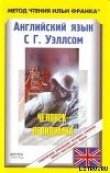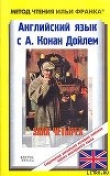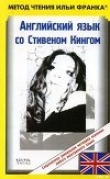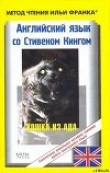
Текст книги "Английский язык с Агатой Кристи. Убийства по алфавиту"
Автор книги: Илья Франк
Соавторы: Agatha Christie,Евгения Мерзлякова
Жанры:
Языкознание
,сообщить о нарушении
Текущая страница: 5 (всего у книги 39 страниц) [доступный отрывок для чтения: 14 страниц]
V. Mary Drower
(Мэри Дроуер)
I think (я думаю) that I can date my interest in the case from the first mention of the A.B.C. railway guide (что я могу исчислять мой интерес к этому делу с первого упоминания алфавитного железнодорожного справочника). Up till then I had not been able to raise much enthusiasm (до этого я был не в состоянии проявить много энтузиазма; to raise – поднимать; будить; стимулировать). This sordid murder of an old woman in a back street shop was so like the usual type of crime (это жалкое убийство старой женщины в магазине на задворках было так похоже на обычное преступление: «обычный тип преступления»; back street – глухая улица, закоулок) reported in the newspapers (/о котором/ сообщается в газетах) that it failed to strike a significant note (что ему не удалось прогреметь значительной нотой; to strike – ударять; извлекать звук). In my own mind (в своем собственном уме) I had put down the anonymous letter with its mention of the 21st(я соотнес анонимное письмо с упоминанием двадцать первого /числа/) as a mere coincidence (как простое совпадение).
raise [reɪz], enthusiasm [ɪnˈƟju:zɪæz(ǝ)m], significant [sɪɡˈnɪfɪkǝnt]
I think that I can date my interest in the case from the first mention of the A.B.C. railway guide. Up till then I had not been able to raise much enthusiasm. This sordid murder of an old woman in a back street shop was so like the usual type of crime reported in the newspapers that it failed to strike a significant note. In my own mind I had put down the anonymous letter with its mention of the 21st as a mere coincidence.
Mrs. Ascher (миссис Эшер), I felt reasonably sure (я чувствовал достаточно уверенно; to feel), had been the victim of her drunken brute of a husband (была жертвой /этого/ пьяного животного – ее мужа; brute – животное; «скотина»). But now the mention of the railway guide (но теперь упоминание железнодорожного справочника) (so familiarly known by its abbreviation of A.B.C. (столь привычно знакомого из-за своей аббревиатуры Эй-би-си; familiar – привычный; знакомый; to know – знать), listing as it did all railway stations in their alphabetical order (перечисляющего, как он делал, все железнодорожные станции в их алфавитном порядке)) sent a quiver of excitement through me (послало волну возбуждения сквозь меня; to send – посылать, отправлять). Surely (конечно/несомненно) – surely (конечно) this could not be a second coincidence (это не могло быть вторым совпадением)?
The sordid crime took on a new aspect (жалкое убийство приобретало новый аспект; to take on – принимать на службу; приобретать /качество/).
Who was the mysterious individual (кто была эта загадочная личность) who had killed Mrs. Ascher (которая убила миссис Эшер) and left an A.B.C. railway guide behind him (и оставила после себя железнодорожный справочник «Эй-би-си»)?
familiarly [fǝˈmɪlɪǝlɪ], quiver [ˈkwɪvǝ], mysterious [mɪsˈtɪǝrɪǝs]
Mrs. Ascher, I felt reasonably sure, had been the victim of her drunken brute of a husband. But now the mention of the railway guide (so familiarly known by its abbreviation of A.B.C., listing as it did all railway stations in their alphabetical order) sent a quiver of excitement through me. Surely – surely this could not be a second coincidence?
The sordid crime took on a new aspect.
Who was the mysterious individual who had killed Mrs. Ascher and left an A.B.C. railway guide behind him?
When we left the police station (когда мы вышли из полицейского участка) our first visit was to the mortuary (наш первый визит был в морг) to see the body of the dead woman (/чтобы/ увидеть тело мертвой женщины). A strange feeling came over me (странное чувство охватило меня) as I gazed down on that wrinkled old face (когда я разглядывал это морщинистое лицо) with the scanty grey hair (с редкими седыми волосами) drawn back tightly from the temples (гладко стянутыми назад с висков; to draw – тащить; стягивать). It looked so peaceful (оно выглядело таким мирным; peace – мир), so incredibly remote from violence (таким невероятно отдаленным от насилия; credible – вероятный, правдоподобный).
"Never knew who or what struck her," observed the sergeant (никогда = так и не узнала, кто или что ударило ее, – заметил сержант; to know).
"That's what Dr. Kerr says (доктор Керр именно так и говорит: «это то, что говорит Доктор Керр»). I'm glad it was that way (я рад, что это было так), poor old soul (бедняжка: «бедная старая душа»). A decent woman she was (славной женщиной она была; decent – приличный; пристойный; разг. славный, хороший)."
mortuary [ˈmɔ:tʃu(ǝ)rɪ], violence [ˈvaɪǝlǝns], decent [ˈdi:sǝnt]
When we left the police station our first visit was to the mortuary to see the body of the dead woman. A strange feeling came over me as I gazed down on that wrinkled old face with the scanty grey hair drawn back tightly from the temples. It looked so peaceful, so incredibly remote from violence.
"Never knew who or what struck her," observed the sergeant.
"That's what Dr. Kerr says. I'm glad it was that way, poor old soul. A decent woman she was."
«She must have been beautiful once,» said Poirot (она, должно быть, когда-то была красива, – сказал Пуаро; beauty – красота).
"Really?" I murmured incredulously (действительно? – я пробормотал недоверчиво; credulous – доверчивый, легковерный).
"But yes (о, да), look at the line of the jaw (посмотрите на линию челюсти), the bones (кости), the moulding of the head (форму головы; moulding – отливка, формовка)."
He sighed as he replaced the sheet (он вздохнул, когда вернул на место простыню) and we left the mortuary (и мы вышли из морга).
Our next move was a brief interview with the police surgeon (нашим следующим ходом был короткий разговор с полицейским хирургом; interview – встреча; беседа, разговор; опрос).
Dr. Kerr was a competent-looking middle-aged man (доктор Керр был компетентно выглядящим человеком средних лет). He spoke briskly and with decision (он говорил живо / отрывисто и решительно: «с решением»).
incredulously [ɪnˈkredjulǝslɪ], moulding [ˈmǝʋldɪŋ], interview [ˈɪntǝvju:]
«She must have been beautiful once,» said Poirot.
"Really?" I murmured incredulously.
"But yes, look at the line of the jaw, the bones, the moulding of the head."
He sighed as he replaced the sheet and we left the mortuary.
Our next move was a brief interview with the police surgeon.
Dr. Kerr was a competent-looking middle-aged man. He spoke briskly and with decision.
«The weapon wasn't found,» he said (оружие не было найдено). "Impossible to say what it may have been (невозможно сказать, что это могло быть). A weighted stick (утяжеленная трость/палка), a club (дубинка), a form of sandbag (какой-нибудь мешок с песком) – any of those would fit the case (все подошло бы в этом случае)."
"Would much force be needed to strike such a blow (понадобилась бы большая сила, чтобы нанести такой удар)?"
The doctor shot a keen glance at Poirot (доктор бросил на Пуаро резкий взгляд; to shoot – стрелять; бросаться; keen – острый; резкий).
"Meaning (/вы имеете/ в виду), I suppose (я полагаю), could a shaky old man of seventy do it (мог ли трясущийся старик семидесяти /лет/ сделать это)? Oh, yes, it's perfectly possible (это совершенно возможно) – given sufficient weight in the head of the weapon (если принять во внимание значительный вес верхней части оружия: «в голове оружия»), quite a feeble person could achieve the desired result (весьма слабый человек мог бы достичь желаемого результата)."
weapon [ˈwep(ǝ)n], sufficient [s(ǝ)ˈfɪʃ(ǝ)nt], weight [weɪt]
«The weapon wasn't found,» he said. «Impossible to say what it may have been. A weighted stick, a club, a form of sandbag – any of those would fit the case.»
"Would much force be needed to strike such a blow?"
The doctor shot a keen glance at Poirot.
"Meaning, I suppose, could a shaky old man of seventy do it? Oh, yes, it's perfectly possible – given sufficient weight in the head of the weapon, quite a feeble person could achieve the desired result."
''Then the murderer could just as well be a woman as a man (тогда убийца мог бы быть /как/ женщиной, так и мужчиной)?"
The suggestion took the doctor somewhat aback (это предположение отчасти захватило доктора врасплох; to suggest – предлагать; to take aback – застать врасплох; somewhat – что-то, кое-что; отчасти, слегка).
"A woman, eh (женщина, да)? Well, I confess (так, я признаю) it never occurred to me to connect a woman with this type of crime (мне никогда не приходило в голову связать женщину с этим видом преступления). But of course it's possible (но, конечно, это возможно) – perfectly possible (совершенно возможно). Only, psychologically speaking (только, с психологической точки зрения: «психологически говоря»), I shouldn't say this was a woman's crime (я бы не сказал, что это было женское преступление)."
Poirot nodded his head in eager agreement (Пуаро кивнул головой с живым согласием; eager – страстно желающий, жаждущий /о человеке/; интенсивный, напряженный; энергичный, активный /о желании, взгляде, жесте и т.п. /; to agree – соглашаться).
psychologically [saɪkǝˈlɔʤɪkǝlɪ] eager [ˈi:ɡǝ] agreement [ǝɡˈri:mǝnt]
''Then the murderer could just as well be a woman as a man?"
The suggestion took the doctor somewhat aback.
"A woman, eh? Well, I confess it never occurred to me to connect a woman with this type of crime. But of course it's possible – perfectly possible. Only, psychologically speaking, I shouldn't say this was a woman's crime."
Poirot nodded his head in eager agreement.
"Perfectly, perfectly (совершенно). On the face of it (на первый взгляд: «на поверхности этого»), highly improbable (совершенно неправдоподобно). But one must take all possibilities into account (но нужно принимать в расчет все возможности). The body was lying (тело лежало; to lie – лежать) – how (как)?"
The doctor gave us a careful description of the position of the victim (доктор дал нам тщательное описание положения жертвы; careful – заботливый; тщательный; осторожный).
It was his opinion (по его мнению: «это было его мнение») that she had been standing with her back to the counter (что она стояла спиной к прилавку) (and therefore to her assailant (и, следовательно, к нападающему / противнику) when the blow had been struck (когда удар был нанесен; to strike – ударять).
She had slipped down in a heap behind the counter (она свалилась: «соскользнула вниз грудой» позади прилавка; heap – груда, масса, куча) quite out of sight of anyone (совершенно вне поля зрения любого) entering the shop casually (случайно зашедшего в магазин).
possibility [ˌpɔsǝˈbɪlɪtɪ], therefore [ˈðɛǝfɔ:], assailant [ǝˈseɪlǝnt]
«Perfectly, perfectly. On the face of it, highly improbable. But one must take all possibilities into account. The body was lying – how?»
The doctor gave us a careful description of the position of the victim.
It was his opinion that she had been standing with her back to the counter (and therefore to her assailant) when the blow had been struck.
She had slipped down in a heap behind the counter quite out of sight of anyone entering the shop casually.
When we had thanked Dr. Kerr (когда мы поблагодарили доктора Керра) and taken our leave (и удалились; to take one's leave), Poirot said: "You perceive, Hastings (вы понимаете, Гастингс; to perceive – воспринимать, понимать, осознавать; постигать), that we have already one further point in favour of Ascher's innocence (что у нас уже есть один дополнительный пункт в пользу невиновности Эшера; further – дальше; дополнительный). If he had been abusing his wife and threatening her (если бы он оскорблял свою жену и угрожал ей), she would have been facing him over the counter (она бы стояла к нему лицом через прилавок). Instead (вместо /этого/), she had her back to her assailant (она стояла спиной к нападающему: «она имела свою спину к нападающему»; to assail – нападать, атаковать) – obviously she is reaching down tobacco or cigarettes for a customer (очевидно, она достает табак или сигареты для покупателя)."
I gave a little shiver (я слегка вздрогнул). "Pretty gruesome (довольно отвратительно/ужасно)."
Poirot shook his head gravely (Пуаро серьезно покачал головой). "Pauvre femme," he murmured (фр. бедная женщина, – пробормотал он).
perceive [pǝˈsi:v], further [ˈfǝ:ðǝ], grue [ˈɡru:sǝm]
When we had thanked Dr. Kerr and taken our leave, Poirot said: «You perceive, Hastings, that we have already one further point in favour of Ascher's innocence. If he had been abusing his wife and threatening her, she would have been facing him over the counter. Instead, she had her back to her assailant – obviously she is reaching down tobacco or cigarettes for a customer.»
I gave a little shiver. "Pretty gruesome."
Poirot shook his head gravely. "Pauvre femme," he murmured.
Then he glanced at his watch (затем он посмотрел на свои часы).
"Overton is not, I think, many miles from here (Овертон, я думаю, не за много миль от сюда). Shall we run over there (следует ли нам поспешить: «побежать» туда) and have an interview with the niece of the dead woman (и поговорить с племянницей убитой: «мертвой женщины»)?"
"Surely you will go first to the shop (наверняка вам лучше сперва пойти в магазин) where the crime took place (где произошло преступление: «где имело место преступление»; to take place)?"
"I prefer to do that later (я предпочитаю сделать это позднее). I have a reason (у меня есть причина)."
He did not explain further (он дальше не объяснил), and a few minutes later we were driving on the London road in the direction of Overton (и несколькими минутами позднее мы ехали по лондонской дороге в направлении Овертона).
glance [ɡlɑ:ns], reason [ˈri:z(ǝ)n], direction [dɪˈrekʃ(ǝ)n]
Then he glanced at his watch.
"Overton is not, I think, many miles from here. Shall we run over there and have an interview with the niece of the dead woman?"
"Surely you will go first to the shop where the crime took place?"
"I prefer to do that later. I have a reason."
He did not explain further, and a few minutes later we were driving on the London road in the direction of Overton.
The address (/по/ адресу) which the inspector had given us (который дал нам инспектор) was that of a good-sized house about a mile on the London side of the village (был большой дом примерно в миле от деревни в сторону Лондона: «был тот дома хорошего размера примерно в миле в лондонской стороне деревни»).
Our ring at the bell was answered by a pretty dark-haired girl (на наш звонок вышла хорошенькая темноволосая девушка: «на наш звонок колокольчика ответила хорошенькая темноволосая девушка») whose eyes were red with recent weeping (чьи глаза были красными от недавних рыданий).
Poirot said gently (Пуаро мягко сказал): "Ah (а)! I think (я думаю) it is you (это вы) who are Miss Mary Drower (/кто есть/ мисс Мэри Дроуер), the parlour maid here (горничная здесь; parlour – гостиная, общая комната; maid – служанка, горничная; девушка)?"
"Yes, sir, that's right (да, сэр, это правильно). I'm Mary, sir (я Мэри, сэр)."
"Then perhaps I can talk to you for a few minutes (тогда, возможно, я смогу поговорить с вами несколько минут) if your mistress will not object (если ваша хозяйка не будет возражать). It is about your aunt, Mrs. Ascher (это касается вашей тети, миссис Эшер)."
"The mistress is out, sir (хозяйки нет, сэр; to be out – отсутствовать: быть вне»). She wouldn't mind, I'm sure (она бы не возражала, я уверена), if you came in here (если бы вы вошли сюда)."
recent [ˈri:sǝnt], parlour [ˈpɑ:lǝ], object v. [ǝbˈʤekt] object n. [ˈɔbʤɪkt]
The address which the inspector had given us was that of a good-sized house about a mile on the London side of the village.
Our ring at the bell was answered by a pretty dark-haired girl whose eyes were red with recent weeping.
Poirot said gently: "Ah! I think it is you who are Miss Mary Drower, the parlour maid here?"
"Yes, sir, that's right. I'm Mary, sir."
"Then perhaps I can talk to you for a few minutes if your mistress will not object. It is about your aunt, Mrs. Ascher."
"The mistress is out, sir. She wouldn't mind, I'm sure, if you came in here."
She opened the door of a small morning room (она открыла дверь маленькой гостиной: «утренней комнаты»; morning room – гостиная в больших, старинных домах, расположенная с восточной стороны дома). We entered and Poirot (мы зашли, и Пуаро), seating himself on a chair by the window (усевшись на стул у окна), looked up keenly into the girl's face (резко/проницательно посмотрел в лицо девушки).
"You have heard of your aunt's death, of course (вы, конечно, слышали о смерти вашей тети)?"
The girl nodded (девушка кивнула), tears coming once more into her eyes (слезы снова показались в ее глазах). "This morning, sir (этим утром, сэр). The police came over (приезжала полиция). Oh! it's terrible (о, это ужасно)! Poor auntie (бедная тетушка)! Such a hard life as she'd had, too (к тому же у нее была такая тяжелая жизнь: «такая тяжелая жизнь, как у нее была, к тому же»). And now this (и теперь это) – it's too awful (это слишком ужасно).''
"The police did not suggest your returning to Andover (полиция не предложила вам вернуться в Эндовер)?"
"They said I must come to the inquest (они сказали, что я должна приехать на дознание; inquest – следствие, дознание) – that's on Monday, sir (это в понедельник, сэр). But I've nowhere to go there (но мне некуда пойти там = негде остановиться) – I couldn't fancy being over the shop (я не могу представить себе = боюсь оставаться в этом магазине; to be over – приходить в чей-то дом) – now (теперь) – and what with the housemaid being away (и что, /если/ горничной не будет /дома/). I didn't want to put the mistress out more than may be (мне бы не хотелось доставлять больше, чем можно, неудобства хозяйке; to put out – выгонять; выкладывать; доставлять неудобства)."
"You were fond of your aunt, Mary?" said Poirot gently (вы любили вашу тетю, Мэри? – мягко сказал Пуаро; to be fond of – любить, нравиться; увлекаться).
aunt [ɑ:nt], inquest [ˈɪnkwǝst], awful [ˈɔ:fʋl]
She opened the door of a small morning room. We entered and Poirot, seating himself on a chair by the window, looked up keenly into the girl's face.
"You have heard of your aunt's death, of course?"
The girl nodded, tears coming once more into her eyes. "This morning, sir. The police came over. Oh! it's terrible! Poor auntie! Such a hard life as she'd had, too. And now this – it's too awful.''
"The police did not suggest your returning to Andover?"
"They said I must come to the inquest – that's on Monday, sir. But I've nowhere to go there – I couldn't fancy being over the shop – now – and what with the housemaid being away. I didn't want to put the mistress out more than may be."
"You were fond of your aunt, Mary?" said Poirot gently.
"Indeed I was, sir (да, на самом деле /любила/, сэр). Very good she's been to me always (и она всегда была очень добра ко мне), auntie has (/моя/ тетушка). I went to her in London (я ездила к ней в Лондон) when I was eleven years old (когда мне было одиннадцать лет), after mother died (после того, как мама умерла). I started in service (я пошла в служанки) when I was sixteen (когда мне было шестнадцать), but I usually went along to auntie's on my day out (но я обычно ездила к тетушке на выходной; day out/off – выходной). A lot of trouble she went through with that German fellow (она прошла через много проблем с тем немецким супругом; fellow – приятель; товарищ; супруг). 'My old devil (мой старый дьявол),' she used to call him (она, бывало, называла его). He'd never let her be in peace anywhere (он никогда нигде не оставлял ее в покое). Sponging (пьющее; sponge – губка; тампон; разг. пьяница), cadging old beast (попрошайничающее старое животное; to cadge – клянчить, попрошайничать)."
sponging [ˈspɔnʤɪŋ], cadging [ˈkæʤɪŋ], beast [bi:st]
«Indeed I was, sir. Very good she's been to me always, auntie has. I went to her in London when I was eleven years old, after mother died. I started in service when I was sixteen, but I usually went along to auntie's on my day out. A lot of trouble she went through with that German fellow. 'My old devil,' she used to call him. He'd never let her be in peace anywhere. Sponging, cadging old beast.»
The girl spoke with vehemence (девушка говорила горячо: «с горячностью»).
"Your aunt never thought of freeing herself by legal means from this persecution (ваша тетя никогда не думала о том, /чтобы/ освободить себя от подобного преследования законными методами; to persecute – преследовать)?"
"Well, you see, he was her husband, sir (но, видите ли, это был ее муж, сэр), you couldn't get away from that (вы не смогли бы от этого избавиться)."
The girl spoke simply but with finality (девушка говорила просто, но тоном, не допускавшим дальнейшего обсуждения; finality – законченность, завершенность).
"Tell me, Mary (скажите мне, Мэри), he threatened her, did he not (он угрожал ей, не так ли)?"
legal [ˈli:ɡǝl], persecution [ˌpǝ:sɪˈkju:ʃ(ǝ)n], threaten [ˈƟret(ǝ)n]
The girl spoke with vehemence.
"Your aunt never thought of freeing herself by legal means from this persecution?"
"Well, you see, he was her husband, sir, you couldn't get away from that."
The girl spoke simply but with finality.
"Tell me, Mary, he threatened her, did he not?"
"Oh, yes, sir, it was awful the things he used to say (это было ужасно, вещи /которые/ он, бывало, говорил). That he'd cut her throat, and suchlike (что он перережет ей горло и подобное). Cursing and swearing too (проклиная и ругаясь к тому же) – both in German and in English (и на немецком, и на английском). And yet auntie says (и все-таки тетушка говорила) he was a fine handsome figure of a man (он был великолепно сложен: «прекрасная красивая фигура мужчины») when she married him (когда она вышла за него). It's dreadful to think, sir (это страшно подумать, сэр), what people come to (до чего могут дойти люди)."
"Yes, indeed (да, в самом деле). And so, I suppose, Mary (и так, я полагаю, Мэри), having actually heard the threats (действительно, услышав эти угрозы), you were not so very surprised (вы не очень удивились) when you learnt what had happened (когда вы узнали, что случилось)?"
throat [Ɵrǝʋt], swear [swɛǝ], dreadful [ˈdredfʋl]
«Oh, yes, sir, it was awful the things he used to say. That he'd cut her throat, and suchlike. Cursing and swearing too – both in German and in English. And yet auntie says he was a fine handsome figure of a man when she married him. It's dreadful to think, sir, what people come to.»
"Yes, indeed. And so, I suppose, Mary, having actually heard the threats, you were not so very surprised when you learnt what had happened?"
"Oh, but I was, sir (но я была /удивлена/, сэр). You see, sir (видите ли, сэр), I never thought for one moment (я ни на минуту не думала) that he meant it (что он имел это в виду = что он говорил это всерьез; to mean – иметь в виду, подразумевать). I thought (я думала) it was just nasty talk and nothing more to it (это была просто злая болтовня и ничего больше; talk – разговор; обсуждение; болтовня). And it isn't as though auntie was afraid of him (и будто бы тетушка не боялась его). Why, I've seen him slip away like a dog with its tail between its legs (да, я видела, /как/ он убегал как собака, поджав хвост: «с хвостом между ног») when she turned on him (когда она обращала /свой гнев/ на него; to turn on – нацеливать, направлять). He was afraid of her if you like (он ее боялся, если угодно)."
"And yet she gave him money (и все же она давала ему деньги)?"
"Well, he was her husband, you see, sir (так, он был ее мужем, понимаете, сэр)."
"Yes, so you said before (да, вы уже это говорили)." He paused for a minute or two (он прервался на минуту или две). Then he said (затем он сказал). "Suppose that (представьте что), after all (в конце концов), he did not kill her (он не убивал ее)."
"Didn't kill her?" She stared (не убивал ее? – она уставилась /на него/).
nasty [ˈnɑ:stɪ], tail [teɪl], suppose [sǝˈpǝʋz]
«Oh, but I was, sir. You see, sir, I never thought for one moment that he meant it. I thought it was just nasty talk and nothing more to it. And it isn't as though auntie was afraid of him. Why, I've seen him slip away like a dog with its tail between its legs when she turned on him. He was afraid of her if you like.»
"And yet she gave him money?"
"Well, he was her husband, you see, sir."
"Yes, so you said before." He paused for a minute or two. Then he said. "Suppose that, after all, he did not kill her."
"Didn't kill her?" She stared.
"That is what I said (это то, что я сказал = да, именно). Supposing someone else killed her (предположим, что кто-то еще убил ее). Have you any idea (есть ли у вас предположение; idea – идея, мысль, предположение) who that someone else could be (кто этот кто-то еще мог быть)?"
She stared at him with even more amazement (она посмотрела на него даже еще с большим удивлением; to amaze – изумлять, поражать, удивлять). "I've no idea, sir (не имею представления, сэр). It doesn't seem likely (это кажется невероятным), though (тем не менее), does it (не так ли)?"
"There was no one your aunt was afraid of (там не было никого, кого бы ваша тетя боялась)?"
Mary shook her head (Мэри покачала головой). "Auntie wasn't afraid of people (тетушка не боялась людей). She'd a sharp tongue (у нее был острый язык) and she would stand up to anybody (и она бы противостояла кому угодно)."
"You never heard her mention anyone (вы не слышали, /чтобы/ она упоминала кого-нибудь) who had a grudge against her (у кого была злоба по отношению к ней: «против нее»; grudge – недовольство; злоба; зависть)?"
"No, indeed, sir (нет, на самом деле = вовсе нет, сэр)."
though [ðǝʋ], tongue [tʌŋ], grudge [ɡrʌʤ]
«That is what I said. Supposing someone else killed her. Have you any idea who that someone else could be?»
She stared at him with even more amazement. "I've no idea, sir. It doesn't seem likely, though, does it?"
"There was no one your aunt was afraid of?"
Mary shook her head. "Auntie wasn't afraid of people. She'd a sharp tongue and she would stand up to anybody."
"You never heard her mention anyone who had a grudge against her?"
"No, indeed, sir."
"Did she ever get anonymous letters (она когда-нибудь получала анонимные письма)?"
"What kind of letters did you say, sir (какие письма, вы сказали, сэр)?"
"Letters that weren't signed (письма, которые не были подписаны) – or only signed by something in A.B.C. (или подписаны каким-нибудь Эй-би-си)" He watched her narrowly (он пристально посмотрел на нее; narrow – узкий, тесный; тщательный), but plainly she was at a loss (но /было/ ясно, что она была в растерянности; to be at a loss). She shook her head wonderingly (она удивленно покачала головой; to wonder – удивляться; интересоваться).
"Has your aunt any relations except you (есть ли у вашей тети родственники кроме вас)?"
sign [saɪn], narrowly [ˈnærǝʋlɪ], wonderingly [ˈwʌndǝrɪŋlɪ]
«Did she ever get anonymous letters?»
"What kind of letters did you say, sir?"
"Letters that weren't signed – or only signed by something in A.B.C…» He watched her narrowly, but plainly she was at a loss. She shook her head wonderingly.
"Has your aunt any relations except you?"
"Not now, sir (уже нет: «не теперь», сэр). One of ten she was (одной из десяти она была), but only three lived to grow up (но только трое выжили /и/ выросли). My Uncle Tom was killed in the war (мой дядя Том был убит на войне), and my Uncle Harry went to South America (а мой дядя Гарри уехал в Южную Америку) and no one's heard of him since (и с тех пор о нем никто не слышал), and mother's dead, of course (и мама умерла, конечно), so there's only me (так только я)."
"Had your aunt any savings (у вашей тети были какие-нибудь сбережения; to save – спасать; беречь; экономить)? Any money put by (какие-нибудь вложения: «вложенные деньги»)?"
"She'd a little in the Savings Bank, sir (у нее было немного в сберегательном банке, сэр) – enough to bury her proper (достаточно, чтобы как следует похоронить ее), that's what she always said (так она всегда говорила). Otherwise she didn't more than just make ends meet (во всем остальном она не более чем сводила концы с концами; otherwise – иначе в других отношениях; во всем остальном; to make two ends meet – сводить концы с концами) – what with her old devil and all (с ее старым дьяволом, и все /такое/)."
enough [ɪˈnʌf], bury [ˈberɪ], otherwise [ˈʌðǝwaɪz]
«Not now, sir. One of ten she was, but only three lived to grow up. My Uncle Tom was killed in the war, and my Uncle Harry went to South America and no one's heard of him since, and mother's dead, of course, so there's only me.»
"Had your aunt any savings? Any money put by?"
"She'd a little in the Savings Bank, sir – enough to bury her proper, that's what she always said. Otherwise she didn't more than just make ends meet – what with her old devil and all."
Poirot nodded thoughtfully (Пуаро задумчиво кивнул). He said – perhaps more to himself than to her (вероятно, больше себе, чем ей): "At present one is in the dark (пока /мы/ в неведении: «в настоящее время /мы/ в темноте») – there is no direction (пути нет; direction – адрес; указание, как дойти) – if things get clearer (если все прояснится: «если вещи прояснятся») – "He got up (он встал; to get up – вставать; подниматься)." If I want you at any time, Mary (если вы мне еще понадобитесь, Мэри: «если я /буду/ нуждаться в вас в любое время»), I will write to you here (я напишу вам сюда)."
"As a matter of fact, sir (на самом деле, сэр), I'm giving in my notice (я ухожу с работы; to give in one's notice – подать (нанимателю) заявление об уходе с работы). I don't like the country (мне не нравится деревня). I stayed here (я оставалась здесь) because I fancied (потому что я думала; to fancy – воображать, представлять себе) it was a comfort to auntie to have me near by (что тете будет спокойно, /когда/ я рядом: «иметь меня рядом»). But now (но теперь)" – again the tears rose in her eyes (снова слезы появились в ее глазах) – "there's no reason I should stay (нет причины, чтобы я оставалась: «/по которой/ мне следует оставаться»), and so I'll go back to London (так что я возвращаюсь в Лондон). It's gayer for a girl there (веселее там для девушки; gay – веселый, радостный)."







